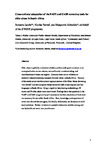Cross-cultural adaptation of the EAST and CASE screening tools for elder abuse in South Africa
| dc.contributor.author | Jacobs, R | |
| dc.contributor.author | Farina, Nicolas | |
| dc.contributor.author | Schneider, M | |
| dc.contributor.author | on behalf of the STRiDE programme, | |
| dc.date.accessioned | 2023-01-31T15:00:57Z | |
| dc.date.issued | 2023-02-03 | |
| dc.identifier.issn | 1540-4129 | |
| dc.identifier.issn | 1540-4129 | |
| dc.identifier.uri | http://hdl.handle.net/10026.1/20221 | |
| dc.description.abstract |
Elder abuse is globally considered a hidden problem with great variations in its conceptualization across cultures, non-uniformity in understanding, and manifestations of abuse and neglect. Currently, there are no validated or culturally adapted screening measures for elder abuse in South Africa. The aim of this study was to test the cultural appropriateness of the Elder Abuse Screening Tool (EAST) and the Caregiver Abuse Screen (CASE) in two regions and four languages in South Africa. Using a cognitive interviewing methodology, 23 carers and 19 older adults were interviewed. Findings show that questions in the EAST and CASE are generally well understood, but that adaptations of both tools are necessary for use within South Africa. Fear, knowledge, and experience of crime also showed that strangers, like family, deliberately use deception to build trust and abuse. Further validation is needed to determine suitable scoring and use by health and social care practitioners. | |
| dc.format.extent | 369-392 | |
| dc.format.medium | Print-Electronic | |
| dc.language | en | |
| dc.language.iso | en | |
| dc.publisher | Taylor and Francis Group | |
| dc.subject | Cognitive interviewing | |
| dc.subject | out-of-scope | |
| dc.subject | in-scope | |
| dc.subject | carer | |
| dc.subject | caregiver | |
| dc.subject | older adult | |
| dc.subject | older person | |
| dc.subject | community | |
| dc.subject | elder abuse | |
| dc.subject | crime | |
| dc.subject | strangers | |
| dc.subject | family | |
| dc.subject | culture | |
| dc.title | Cross-cultural adaptation of the EAST and CASE screening tools for elder abuse in South Africa | |
| dc.type | journal-article | |
| dc.type | Journal Article | |
| dc.type | Research Support, Non-U.S. Gov't | |
| plymouth.author-url | https://www.webofscience.com/api/gateway?GWVersion=2&SrcApp=PARTNER_APP&SrcAuth=LinksAMR&KeyUT=WOS:000925503900001&DestLinkType=FullRecord&DestApp=ALL_WOS&UsrCustomerID=11bb513d99f797142bcfeffcc58ea008 | |
| plymouth.issue | 5 | |
| plymouth.volume | 34 | |
| plymouth.publication-status | Published | |
| plymouth.journal | Journal of Elder Abuse & Neglect | |
| dc.identifier.doi | 10.1080/08946566.2023.2176393 | |
| plymouth.organisational-group | /Plymouth | |
| plymouth.organisational-group | /Plymouth/Faculty of Health | |
| plymouth.organisational-group | /Plymouth/Faculty of Health/Peninsula Medical School | |
| plymouth.organisational-group | /Plymouth/Users by role | |
| plymouth.organisational-group | /Plymouth/Users by role/Academics | |
| dc.publisher.place | England | |
| dcterms.dateAccepted | 2023-01-26 | |
| dc.rights.embargodate | 2024-2-3 | |
| dc.identifier.eissn | 1540-4129 | |
| rioxxterms.versionofrecord | 10.1080/08946566.2023.2176393 | |
| rioxxterms.licenseref.uri | http://www.rioxx.net/licenses/all-rights-reserved | |
| rioxxterms.type | Journal Article/Review |


